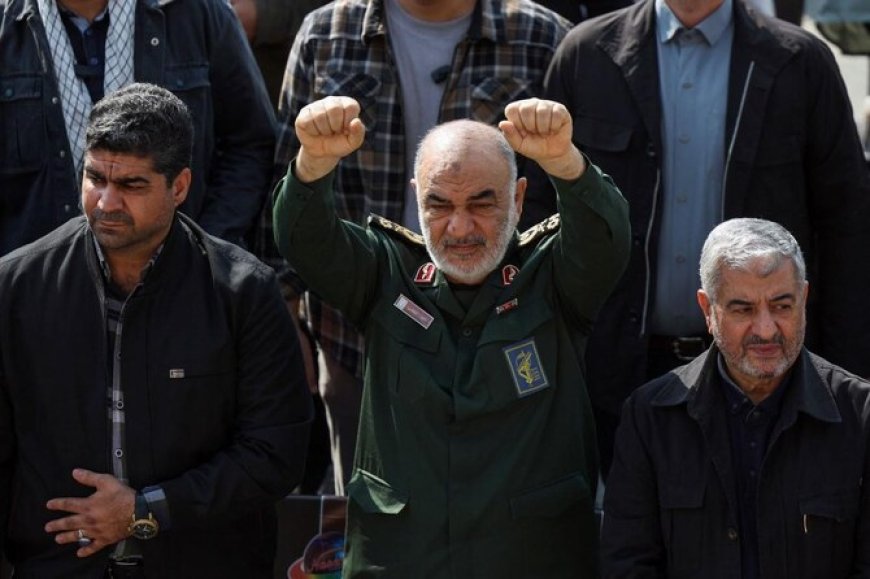The head of the Iran Guards says they will hit Israel "painfully" if they attack Iranian targets.
On Thursday, the leader of Iran's special Revolutionary Guards told Israel not to attack the Islamic Republic in response to a barrage of missiles. This came as Israel's main enemy, Iran, stepped up its operation in Lebanon against Hezbollah, which is backed by Iran. Some people are worried that the missile attack by Iran on October 1 will lead to a bigger war in the Middle East.

On Thursday, the leader of Iran's special Revolutionary Guards told Israel not to attack the Islamic Republic in response to a barrage of missiles. This came as Israel's main enemy, Iran, stepped up its operation in Lebanon against Hezbollah, which is backed by Iran. Some people are worried that the missile attack by Iran on October 1 will lead to a bigger war in the Middle East.
This is because Israel is planning its reaction to the attack. In a live interview, Hossein Salami said, "We tell you (Israel) that if you attack any point, we will painfully attack the same point of yours." He also said that Iran can get through Israel's defenses. On Wednesday, US Defense Secretary Lloyd Austin talked to Israeli Defense Minister Yoav Gallant about Israel's actions in Gaza and Lebanon. The goal was to avoid a war in the area. Iran's Foreign Minister Abbas Araqchi arrived in Cairo for talks with Egyptian officials as part of a tour of the Middle East that came at a time of rising anxiety. The European Union had its first meeting with Gulf states and then put out a statement asking for calm: "We stress the importance of diplomatic engagement with Iran in order to promote regional de-escalation."
Israel is still going after Hezbollah in Lebanon (after killing several of its leaders) and Hamas in Gaza, and it has promised to punish Iran for the attack on October 1. Qatar, which has been in charge of talks to try to end the fighting in Gaza, said that no one had talked to anyone about the problem in the last three to four weeks. 11 Palestinians were killed by Israeli bombings in Gaza City on Thursday, according to doctors. In the north, Israeli forces sent tanks into Jabalia, where Palestinians and UN officials were worried about a lack of food and medicine. People who lived in Jabalia said that Israeli troops destroyed groups of homes from the air, with tank shells, and by putting bombs in buildings and then blowing them up from afar.
Israel has said that it will not stop fighting Hezbollah in northern Lebanon until it is safe for its people to go back to their homes near the border with Lebanon. It has also said that any talks about ending the fighting will take place "under fire." Thursday, the Israeli military said that in southern Lebanon, they had killed 45 Hezbollah soldiers in the past 24 hours, including a battalion leader, and taken many weapons. Attack on the city's offices Sixteen people were killed when an Israeli airstrike destroyed the municipal offices of a big town in south Lebanon on Wednesday. It was the worst hit on an official Lebanese government building since the Israeli air war began. Lebanese officials condemned the attack, which also hurt more than 50 people in Nabatieh, the city of a province, saying it showed that Israel was no longer just going after the armed group Hezbollah but also the Lebanese government.
Caretaker Prime Minister Najib Mikati said that the Israelis "intentionally targeted a meeting of the municipal council to discuss the city's service and relief situation" in order to help people who had to leave their homes because of the Israeli operation. Israel and Hezbollah have been at odds since the militant group started firing rockets at its enemy a year ago to back Hamas, an Islamist group in Gaza. In the past few weeks, the fighting has gotten much worse. The health ministry says that Israeli actions in Lebanon have killed at least 2,350 people and forced more than 1.2 million to leave their homes in the last year.
There is no difference between citizens and fighters in the death toll; hundreds of women and children are among them. In the same time period, Israel says that about 50 people, including troops and citizens, have been killed. Abdelnaser was on the waterfront early Thursday morning. He had to leave the southern areas of Beirut, which are a haven for Hezbollah and have been bombed many times by Israel. "War is now something we do every day." "We know that Lebanon is built up and then destroyed every 10 years," he said.













































